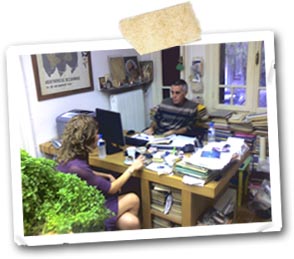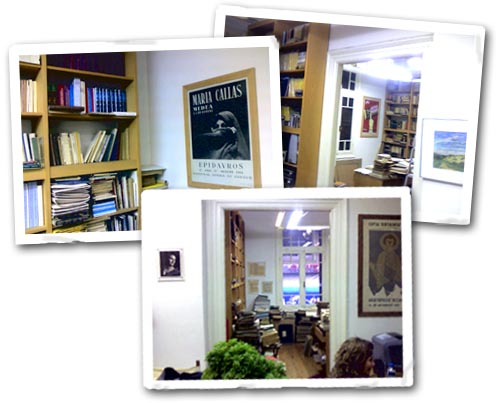Our first shop operated from 1981 to 2001 under the name of Christos Kavvadas & Son at 52 Dim. Gounari, Street, in the neighbourhood of Kamara, Thessalonica. Previously, from 1979 to 1981, we had supplied books and post cards in a used-furniture and curio/antique shop located on the upper floor of an old building in the heart of the city. From 2001, the shop was re-located to the ground floor premises of 9 Bakatselu Street, on the upper side of Egnatia, close to the church of Saint Sophia.
 From the very beginning, we made a conscious choice to collect a wide range of 20th century books and archival material. Our decision was based mainly upon the fact that it was a century rich in historic events that had triggered intense social upheavals; these had left their trace on all manner of documents and manuscripts. The printed documents include pamphlets, newspapers and magazines, books and a wide variety of leaflets (proclamations, announcements, advertisements, etc.) as well as material of any kind relating to contemporary professional or social life.
From the very beginning, we made a conscious choice to collect a wide range of 20th century books and archival material. Our decision was based mainly upon the fact that it was a century rich in historic events that had triggered intense social upheavals; these had left their trace on all manner of documents and manuscripts. The printed documents include pamphlets, newspapers and magazines, books and a wide variety of leaflets (proclamations, announcements, advertisements, etc.) as well as material of any kind relating to contemporary professional or social life.

The archival material, usually in manuscript form, consists of public and private documents or texts; the former include documents from public services such as ministries (of Justice, Education, Agriculture, Public Order, the Interior, et al.). Of particular interest are sets of documents from local authorities (prefectures, municipalities and community services), since these present a detailed picture of the country and people of specific regions while showing how centralized power was exercised in the provinces and how the local population responded to it. The private manuscripts and texts portray family generally from a social and professional perspective; in cases where the perspective is political, the figures playing a role in events of the period are shown to reap the consequences, regardless of whether their role was passive or active. In addition, we collect the archives of commercial enterprises and stores (large and small). These generally provide a picture of the initiative and the personal or family history of the owners combined with the prevailing situation in the country at that time. Finally, we collect “small papers”: all those scraps of paper that people use without paying them particular attention and which, however, convey their own picture of everyday life at the time of their issue. These include tickets, advertisements, programmes of forthcoming events, identity cards, employee work records, receipts, etc.
We believe that we have so far been faithful to certain principles in our relationship with both our suppliers and clients. With the former, whether professionals in their field or private individuals, we have sought permanent collaborations of mutual benefit and have avoided one-off transactions. With the latter, both collectors and representatives of public bodies, we have given overriding priority to the classification, description and pricing of materials in the belief that this will benefit our relationship with our customers as well as the future of our shop in the long-term. Thus, it is not by chance that both suppliers and clients have taught us, amongst other things, to do our work in the best way possible. Now, on the internet, we intend to carry on in same manner remaining faithful to the same principles while in more permanent contact with our clients.
Κ. Schneider, Nestor Kavvadas,
Christos Kavvadas

